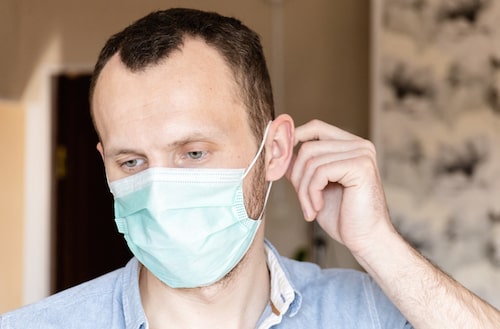Hair Loss and COVID-19 – See the Surprising Connection

Hair loss is a common condition among male and female patients. Some of the common causes for hair loss include genetics as well as a reaction to certain medications or hormonal changes. Many doctors are also reporting another growing cause for hair loss among patients. These doctors say patients are suffering from hair loss related to the coronavirus pandemic and it is impacting people who had the virus along with others that never became sick from COVID-19.
Hair Loss and COVID-19
The majority of people naturally lose somewhere in the range of 50-100 hairs on a daily basis. Hair loss can also occur after an illness but this does not seem to be the case with hair loss related to COVID-19. The loss of hair on the scalp seems to come from the psychological stress of fighting off the virus.
There are also people suffering from hair loss that have not contracted the COVID-19 virus. Instead, they are losing their hair due to emotional stress related to financial difficulties, job loss and the death of family members due to the pandemic.
The ongoing stress related to COVID-19 means the number of patients suffering from hair loss related to the virus continues to increase. A survey was conducted in July about post-COVID symptoms among a group of 1567 survivors of COVID-19. Out of those surveyed, 423 people reported suffering from unusual hair loss. These survey results were reported by the group, Survivor Corps, and Natalie Lambert, an associate research professor at Indiana University of Medicine (who helped to conduct the survey).
Types of Hair Loss Related to COVID-19
 When it comes to hair loss related to the coronavirus pandemic, many doctors say the condition should be temporary but that it could last for several months. Experts say there are two types of hair loss that seemed to be triggered by the pandemic:
When it comes to hair loss related to the coronavirus pandemic, many doctors say the condition should be temporary but that it could last for several months. Experts say there are two types of hair loss that seemed to be triggered by the pandemic:
- Telogen Effluvium can begin several weeks or several months after a sudden stressful experience. Telogen is when the cycle of hair growth is in the resting stage. Telogen Effluvium is the result of stress forcing a large amount of hair roots to make a premature move into the resting phase. While the hair will normally return after some time has passed, the condition can also cause irreversible hair loss in some patients.
- Alopecia Areata (AA) is when the immune system begins to attack the hair follicles. The condition can be made even worse by psychological stress. Alopecia Areata can result in hair loss in all areas of the skin and it creates a bald, patchy appearance in areas that have a lack of hair. Thankfully, the hair follicles that are impacted by AA can produce normal hair growth again if the disease subsides.
Hair Loss and Self-Image
The loss of hair due to the COVID-19 pandemic can increase the amount of stress a person feels as well as have an impact on the way they view their appearance.
People that suffer from a loss of hair can often feel less confident about their appearance and not be as comfortable during their personal interactions with others. A full and healthy head of hair gives a person a youthful look and this can translate to greater success in the workforce. The amount of hair that a person has is often tried to their identity and self-confidence and the loss of hair can have a negative impact on the self-image of a person.
Treating Hair Loss from COVID-19
There are a number of options people can use to treat their hair loss related to COVID-19. They include following a healthy and nutritious diet, practicing stress reduction techniques and taking vitamins such as biotin. The use of minoxidil can be recommended to patients willing to commit to using the product on a daily basis.
It has even been reported that a positive attitude can help in dealing with hair loss that is related to stress. The less anxiety and stress felt by a person, the less likely there will be an extreme amount of stress that can contribute to hair loss.
Patients are also advised to look into undergoing a hair transplant if the hair that is lost due to stress does not return to the scalp. A hair transplant takes hair from the donor area of the scalp (the back or sides of the head) and moves it to areas of the scalp that are suffering from thinning or balding. If there is enough quality donor hair on the scalp to use for a hair transplant, the donor hair can be taken from other areas of the body to place in the scalp. An experienced hair restoration surgeon can examine the scalp of a patient to determine the cause of the hair loss as well as the extent of the condition. The doctor will also let the patient know the type of results that can be expected after the hair transplant along with the best hair restoration option to achieve the desired amount of hair on the head.
MA